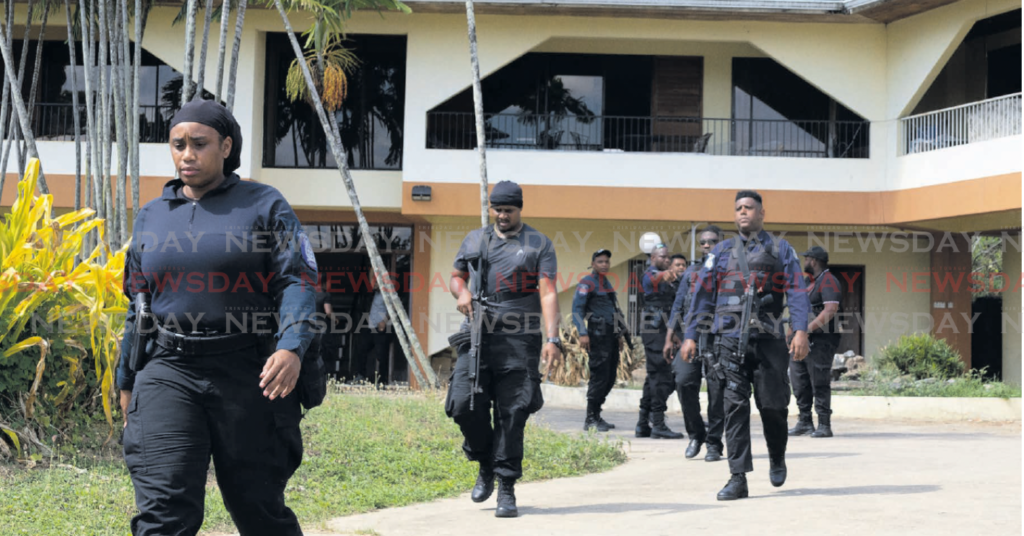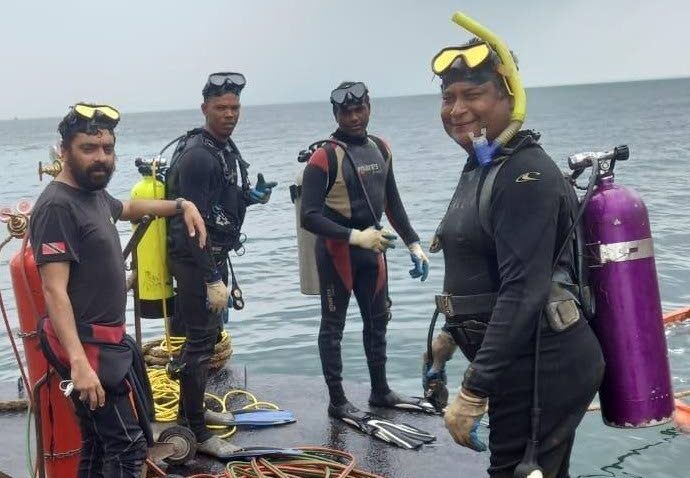Justice 2024 in review

In 2024, Trinidad and Tobago's judicial system took centre stage in public life, marked by legal battles that captured the nation’s attention.
Constitutional challenges, high-profile criminal trials, and pivotal civil suits marked the year. Newsday reviews some of the notable cases that defined the legal landscape.
Auditor General allowed to challenge probe
While the issue of crime and the Police Commissioner’s performance at the helm of the police service took centre stage because of unprecedented levels of crime, also dominating news feeds in 2024 was the imbroglio between Auditor General Jaiwantie Ramdass and Finance Minister Colm Imbert over a Cabinet-ordered investigation into her office, with the Privy Council criticising the government’s actions.
The Privy Council’s decision on November 7, meant that Ramdass's lawsuit, which alleges bias and constitutional breaches in the investigation ordered by Imbert, will proceed to trial.
Ramdass claims the investigation is biased and violated constitutional protections that insulate the Auditor General from external control. The case stems from her refusal to accept amended public accounts from the Ministry of Finance, which understated government revenue by $2.6 billion.
Police Commissioner’s extended term upheld
2024 began with Justice Ricky Rahim dismissing a legal challenge against the government’s decision to extend Police Commissioner Erla Harewood-Christopher's tenure beyond her 60th birthday.
Political activist Ravi Balgobin Maharaj argued the extension violated constitutional principles. However, Rahim ruled the decision lawful, emphasising that the extension adjusted Christopher’s retirement age to 63, without infringing the separation of powers. In December, the Privy Council upheld Rahim’s ruling, dismissing Balgobin Maharaj’s constitutional challenge to the process and the exercise of the President’s discretion. Harewood-Christopher was appointed commissioner on February 10, 2023. The Police Service Act 2006 requires the COP to retire at 60. She turned 60 on May 15, 2023. On May 11, 2023, the President extended the top cop’s tenure by a year. On May 13, 2024, it was further extended by a year to May 15, 2025, on the advice of the Cabinet.
Revenue Authority operationalised
Also in 2024, the Privy Council dismissed a Public Services Association challenge against the Trinidad and Tobago Revenue Authority (TTRA). This ruling cleared constitutional hurdles, enabling the TTRA's long-awaited establishment to streamline tax administration.
Ongoing police promotion disputes
Throughout the year, courts were inundated with lawsuits challenging police promotion exercises and the firearm user's license process, with several decisions calling for procedural transparency within law enforcement.

death of Hannah Mathura whose bones were believed to have been found buried on the property. - Photo by Faith Ayoung
Grisly discoveries
The October arrest of Andrew and Alana Mathura for the murder of their daughter, Hannah, whose remains were found at their Valsayn home seven months earlier, captured national attention.
The couple was charged with Mathura’s murder but Alana Mathura died on November 1, at hospital.

Paria/LMCS charged over pipeline deaths
The tragic deaths of four divers in a 2022 pipeline disaster culminated in the Commission of Enquiry (CoE) recommending criminal charges against Paria Fuel Trading Co Ltd and Land and Marine Construction Services (LMCS). The CoE’s 520-page report labelled Paria’s actions as gross negligence and suggested a corporate manslaughter charge. The companies and their senior managers were charged with a series of occupation, safety and health charges in the magistrates’ court and the Industrial Court. They have all pleaded not guilty to the criminal charges while the matter in the Industrial Court remains in limbo. A ruling by the Privy Council will determine whether the charges filed by the Occupational Safety and Health Authority and Agency (OSHA) in the Paria diving tragedy after a six-month time limit is valid.
Creative license or slander?
Businessman Inshan Ishmael’s defamation victory over calypsonian Winston "Cro Cro" Rawlins in January sparked cultural and legal discourse. In December, the Appeal Court allowed Rawlins to contest Justice Frank Seepersad's ruling, which held that his calypso abused artistic license. Justice of Appeal James Aboud emphasised the importance of delineating satire in calypso from actionable defamation.
DCP cleared
A dangerous driving charge against a deputy commissioner of police was discontinued by the Director of Public Prosecutions (DPP) on December 16 because of insufficient evidence. DPP Roger Gaspard, SC, explained, “The reason why the matter would have been discontinued is because having reviewed the evidence in the file, especially the CCTV footage, I was of the view that there was no fair prospect of conviction on that evidence.
However, the mother of the teenage boy who was allegedly struck has since initiated legal action against the DPP, challenging his decision and describing it as “irrational” and lacking transparency.
Anand Ramlogan’s constitutional claim rejected
Former Attorney General Anand Ramlogan’s constitutional challenge against his prosecution for alleged witness tampering was dismissed by Justice Nadia Kangaloo. This ruling cleared the path for criminal proceedings to continue. Ramlogan has since appealed Kangaloo’s decision.
State acknowledges unlawful detention of gun dealer
In a significant admission, the government conceded that firearm dealer Brent Thomas’s detention and return from Barbados in 2022 was unlawful. The admission was made at the Attorney General’s appeal of a High Court judge’s ruling that permanently stayed all criminal charges against the 61-year-old owner of Specialist Shooters Training Centre. The appellate judges hearing arguments have reserved their ruling.
Health-care negligence and neonatal deaths
Seven neonatal deaths at Port of Spain General Hospital in April prompted a flurry of pre-action protocol against the North West Regional Health Authority. A June report by the Pan American Health Organization revealed infection control lapses, fuelling calls for systemic health-care reform. In November, the first lawsuit stemming from the deaths was filed, seeking accountability and answers from the authorities.
Judiciary clashes with Salaries Review Commission
At the opening of the 2025 law term Chief Justice Ivor Archie signalled potential legal action against the Salaries Review Commission over salary adjustments for judicial officers. Archie's comments during the law term opening underscored tensions between the judiciary and executive. The Prime Minister later admitted the Cabinet’s acceptance of the SRC's 120th report was influenced by the Chief Justice’s threat of legal action.
Major constitutional rulings
Justice Devindra Rampersad upheld the procedure for appointing senior counsel, rejecting claims of political interference. Meanwhile, Minister Foster Cummings filed a constitutional claim over leaked allegations against him, spotlighting privacy and defamation law.
International enforcement — ConocoPhillips vs. PDVSA
In September, Justice Frank Seepersad appointed a receiver over Venezuela’s state-owned oil company, Petróleos de Venezuela, SA (PDVSA) assets in TT, enabling US energy giant ConocoPhillips to enforce a US$1.33 billion claim against Venezuela.

Sedition charge for Canadian YouTuber
Canadian YouTuber Christopher “Chris Must List” Hughes was charged with a single sedition charge which alleges that on May 9, he published a seditious publication (an audio-visual video) on the social media platform YouTube. Hughes is on $100,000 bail on his sedition charge and has been permitted to appear virtually for his next court hearing in January.
Hughes was first arrested in May and then charged. He returned to Canada and returned for his case in late August. On September 5, he was again arrested, for allegedly having evidence of money laundering, based on a video he published. He was arrested for a third time on September 7, and detained for deportation. Hughes accused the Government of tarnishing his name and infringing on his freedoms. Despite this, he said he still loved the country but feared for his safety and freedom while he faced the sedition charge.
Police discharges
Towards the end of the year, 14 police officers were freed in two separate extortion and bribery cases because the police failed to comply with court directives, including the timely preparation and prosecution of the case. It was found that the cases were marred by prosecutorial missteps and repeated non-compliance with court orders. However, in one of the cases, the criminal charges of misbehaviour were reinstated against the seven officers accused of extorting businessmen in Sangre Grande in 2023. The fresh charges were laid by the three police complainants allegedly facing disciplinary action for the initial collapse of the case.
Rape sentencing
A two-year reduction in the sentence of a convicted rapist because of a $15,000 donation to the Rape Crisis Society generated a firestorm of criticism from gender advocates in December, saying it sent the wrong signal.
The society defended its decision to accept the donation, saying it planned to review its procedures for accepting court-ordered donations in the wake of public backlash over the issue. Justice Kathy Ann Waterman-Latchoo admitted the payment of compensation in criminal cases was not unusual, but noted that it did not mean “offenders can pay their way out of trouble.”
She said compensation had its place in sentencing and could operate as a mitigating feature as it acknowledged the harm endured by survivors and could serve to assist them in regaining a sense of justice and control over their future.
She said on a practical level, compensation can help survivors meet the financial realities of recovering and rebuilding their lives since, many, may have had to relocate, and experience disruption in their schooling and employment while also having to bear the financial cost of medical and psychological treatment.
“There is no reason that compensation should not be paid or accepted in sex assault cases where it is appropriate to do so.”
She said compensation should benefit, not inflict further harm on the victim as any financial recompense from the offender may cause distress so it was imperative to get the victim’s views before proceeding with the offer of compensation.
In this case, the victim had asked that the money be paid to the society as it offered professional counselling to survivors of sexual assault.

Comments
"Justice 2024 in review"